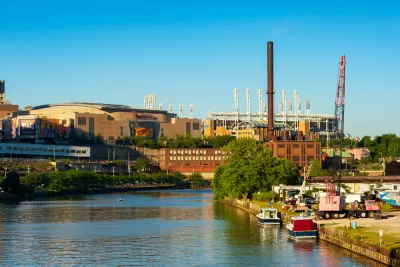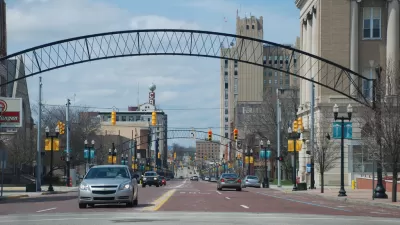A new report outlines seven strategies for balancing economic development and equity specifically aimed at smaller, post-industrial cities.

A Policy Focus Report from the Lincoln Institute of Land Policy outlines how "legacy cities"—post-industrial towns that have largely lost their traditional economic base—"can promote long-term growth while addressing racial and economic inequities laid bare by COVID-19." The report uses case studies to map out strategies guiding "practitioners through equitable investment in both physical projects and people."
As Emma Zehner writes, "[t]he report focuses on small to mid-size legacy cities with populations of 30,000 to 200,000 residents. Though they share many characteristics with their larger counterparts, these cities face unique challenges and require tailored approaches to revitalization." The seven strategies suggested in the report "are tailored to the unique challenges of these small to mid-size legacy cities and also draw on their unique opportunities—such as a lack of market pressures that allows leaders more time to get plans right." Some of the recommendations "build on existing programs—e.g., integrating racial equity analyses into routine local government decision-making—while others stand alone—e.g., programs that build the leadership pipeline and civic capacity of underrepresented groups."
The report's authors emphasize that equity does not have to come at the expense of economic development. In fact, "greater equity can both improve everyone’s access to opportunity and support the economic prospects of cities."
For a deeper dive on equitable economic development in legacy cities, see also the previous iteration of this report, published by the Lincoln Institute of Land Policy in 2017.
FULL STORY: Seven Strategies for Equitable Development in Smaller Legacy Cities

Planetizen Federal Action Tracker
A weekly monitor of how Trump’s orders and actions are impacting planners and planning in America.

Restaurant Patios Were a Pandemic Win — Why Were They so Hard to Keep?
Social distancing requirements and changes in travel patterns prompted cities to pilot new uses for street and sidewalk space. Then it got complicated.

Map: Where Senate Republicans Want to Sell Your Public Lands
For public land advocates, the Senate Republicans’ proposal to sell millions of acres of public land in the West is “the biggest fight of their careers.”

Maui's Vacation Rental Debate Turns Ugly
Verbal attacks, misinformation campaigns and fistfights plague a high-stakes debate to convert thousands of vacation rentals into long-term housing.

San Francisco Suspends Traffic Calming Amidst Record Deaths
Citing “a challenging fiscal landscape,” the city will cease the program on the heels of 42 traffic deaths, including 24 pedestrians.

California Homeless Arrests, Citations Spike After Ruling
An investigation reveals that anti-homeless actions increased up to 500% after Grants Pass v. Johnson — even in cities claiming no policy change.
Urban Design for Planners 1: Software Tools
This six-course series explores essential urban design concepts using open source software and equips planners with the tools they need to participate fully in the urban design process.
Planning for Universal Design
Learn the tools for implementing Universal Design in planning regulations.
Heyer Gruel & Associates PA
JM Goldson LLC
Custer County Colorado
City of Camden Redevelopment Agency
City of Astoria
Transportation Research & Education Center (TREC) at Portland State University
Camden Redevelopment Agency
City of Claremont
Municipality of Princeton (NJ)





























